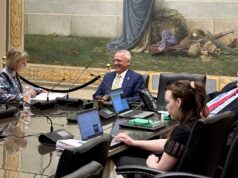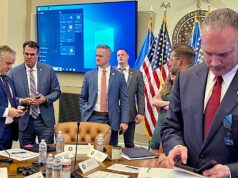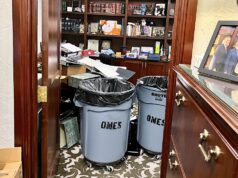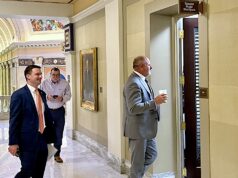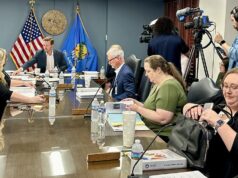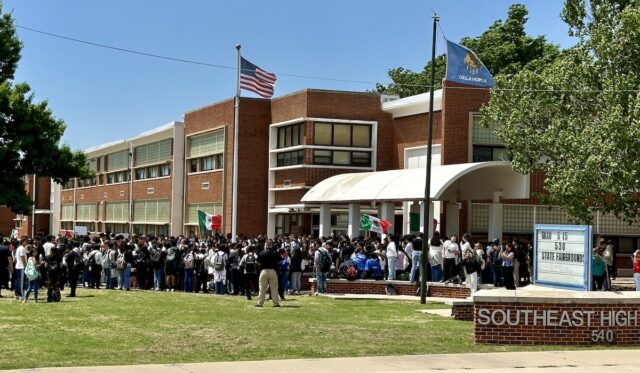

(Update: On Tuesday, April 30, Gov. Kevin Stitt signed HB 4156 into law with a signing statement explaining his rationale. The article below remains in its original form.)
As Gov. Kevin Stitt weighs an impending decision over whether to approve a controversial bill aimed at curbing illegal immigration, students at four Oklahoma City-area high schools walked out of classes Friday afternoon in protest of the legislation.
Additionally, the archbishop of Oklahoma City has also spoken out against the bill, which Stitt has stopped short of saying he would sign.
An hour before classes were set to end Friday, hundreds of students held signs, waved Mexican flags and chanted “No hate! No fear!” on the lawn of Southeast High School. At the same time, students at Santa Fe South, Capitol Hill and U.S. Grant high schools held similar walkouts to protest the bill.
“This is a time when we really do need to unite and talk with each other,” said Nayeli Rojo, a Southeast High School student who helped organize the event. “It was honestly just an event to (…) spread awareness about how [the bill is] affecting us and how it’s affecting our homes.”
Passed by both chambers of the Oklahoma Legislature but awaiting final approval from Stitt — who has through Tuesday to make his decision — HB 4156 would create the crime of “impermissible occupation” for any “non-citizen or national of the United States” to reside in the state without permission or federal legal authorization. Those already working within the country’s immigration system would be exempt from prosecution.
Any person who commits the crime of “impermissible occupation” would be guilty of a misdemeanor on first offense and a felony on second offense. Both would carry possible fines and jail time, and both require offenders to leave the state within 72 hours of release from custody.
Those opposed to the bill say it will result in further marginalization of the state’s Hispanic community, members of which rallied on the north lawn of the State Capitol on Tuesday while the Senate considered the measure.
The bill’s passage drew praise from numerous Republicans in both chambers of the Legislature, many of whom are facing primary reelection campaigns and may have other political aspirations. The bill has also been crafted and pushed heavily by Attorney General Gentner Drummond, who is also a Republican with aspirations for higher office.
“This measure protects immigrants here legally while ensuring law enforcement have the tools necessary to go after criminals,” said Senate President Pro Tempore Greg Treat (R-OKC) in a statement after the bill passed his chamber. “The southern border crisis has created a scourge of illegal activities, including an increase in fentanyl, human trafficking and crime in our communities because of the inaction and abject failure at the federal level to secure our borders. The Oklahoma Legislature is taking the necessary action to protect our citizens. Doing nothing is unconscionable and this legislation is the appropriate measure to keep Oklahomans safe and uphold the rule of law.”
But other stakeholders, including the Archdiocese of Oklahoma City, are strongly opposed to the bill. Stitt, also a Republican, has declined to state whether he will sign the bill, saying Friday that he’s still reviewing it but praising the bill’s intent.
“First off, we have a great Hispanic community in Oklahoma. They contribute a lot to our state (…) — hard-working, entrepreneurial, living the American dream, coming here the right way,” Stitt said Friday morning. “This bill is trying to do what the (President Joe) Biden administration is not doing.”
The term “Hispanic” encompasses more than just people from Mexico, and Stitt said the bill is meant to protect the state from immigrants from other places besides Mexico, including “Communist Chinese,” who he said are illegally crossing the southern border of the United States.
“We have to be a law-and-order state,” Stitt said. “We want immigrants. We’re a country of immigrants that have come in and want to be part of the American dream, but we have to know who they are, and they have to come here legally.”
‘Stood up for our people’
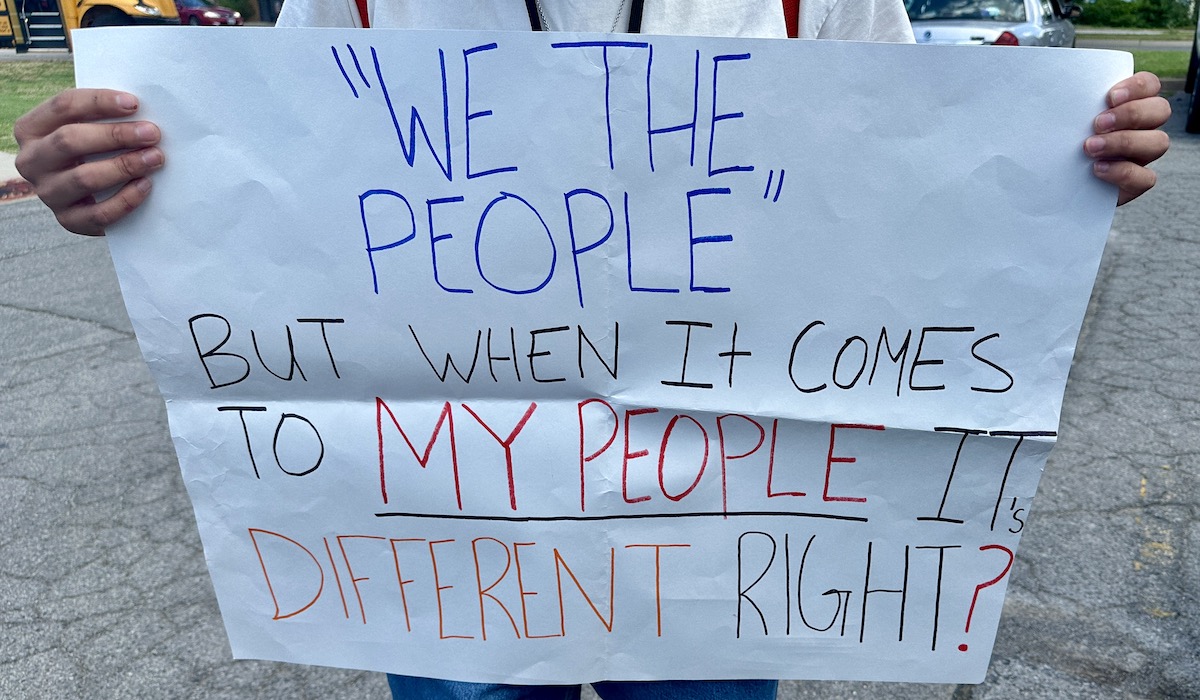
The students who helped organize Friday’s walkouts across four South OKC high school sites said they wished policymakers in the state would recognize the value Oklahoma’s Latino community offers to the state and its economy.
“Having [so many students] be there and just showing total support for our community, especially in these areas that are Hispanic heavy, and just to show our community that we are here for each other (…) is a big point of why we had such a big crowd,” said Alberto Nuñez, a Southeast High School student who helped organize the walkout.
Another student who attended the Southeast High School protest had a simple assessment of the events.
“We just stood up for our people,” said Rolando Gonzalez, a sophomore at Southeast.
The students said that while they did not ask for permission from school administrators to organize the protest, they did work with them to carry out the event, which an Oklahoma City Public Schools spokeswoman confirmed in a statement.
“OKCPS supports our students’ rights to peaceful assembly and their freedom of expression. OKCPS leadership worked closely with students and student groups who wished to assemble today so we could provide them with a safe space to express themselves regarding their opposition to HB 4156,” said OKCPS communications director Crystal Raymond. “Our top priority is always to support the academic and social emotional needs of our students while maintaining a safe and orderly learning environment for all.”
The largely Hispanic student bodies of south OKC high schools are not the only people to take issue with the bill. In a scathing statement, Oklahoma City Archbishop Paul Coakley said the legislation fails to consider the humanity of those immigrating to the U.S.
“House Bill 4156 is flawed legislation that harms communities, separates families and weakens our economy. It fails to address the real criminal issues we face in Oklahoma — seeking a misguided sense of justice at the expense of mercy,” Coakley wrote. “The new law inadvertently will target men and women who are living productive lives with their families, and subject them to jail time, large fines and deportation within 72 hours, separating them from their children.”
Coakley said that while the country’s immigration system needs to be fixed, Oklahoma’s bill is not a good way to address the problem.
“Measures should be considered to protect Oklahoma’s borders, most especially against the influx of human and drug trafficking,” Coakley said. “But, we also must recognize that the vast majority of undocumented immigrants in Oklahoma are upstanding members of our communities and churches, not violent criminals. They assist their communities in many ways and provide needed services. They are our friends and neighbors. They happen to be some of the most vulnerable in our midst.”









